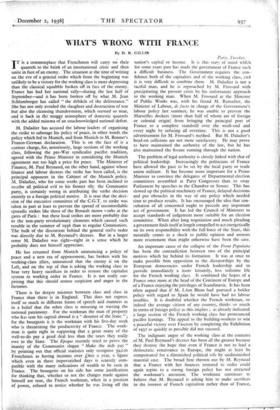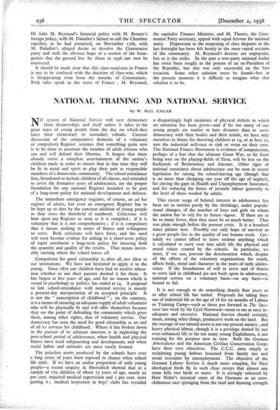ILiT'S WRONG WITH FRANCE
By D. R. GILLIE
M. Daladier has accused the labour leaders of organising the strike to sabotage his policy of peace, in other words the policy which led to Munich, and from Munich to M. Bonnet's Franco-German declaration. This is on the face of it a curious charge, for, notoriously, large sections of the working class, following the pre-War syndicalist pacifist tradition, agreed with the Prime Minister in considering the Munich agreement not too high a price for peace. The Minister of Finance, M. Paul Reynaud, on the other hand, against whose finance and labour decrees the strike has been called, is the principal opponent in the Cabinet of the Munich policy. M. Daladier, who for some weeks past has been inclined to ascribe all political evil to his former ally, the Communist party, is certainly wrong in attributing the strike decision entirely to a foreign political motive. It is true that the deci- sion of the executive committee of the C.G.T. to strike was taken in part at least to prevent the spread of uncontrollable sporadic strikes like those of the Renault motor works at the gates of Paris : but these local strikes are more probably due to the non-party revolutionary elements which caused such trouble in the summer of 1936 than to regular Communists. The bulk of the discontent behind the general strike order was directly due to M. Reynaud's decrees. But in a larger sense M. Daladier was right—right in a sense which he probably does not himself appreciate.
He has returned from Munich announcing a policy of peace and a new era of appeasement, has broken with his working-class allies, announced that the enemy is on the Left, and on the top of that is asking the working class to bear very heavy sacrifices in order to restore the capitalist system to working order in France. It is not really sur- prising that this should arouse suspicion and anger in the factories.
There is far deeper mistrust between class and class in France than there is in England. This does not express itself so much in different forms of speech and manners as in a belief that the other class is misusing or wasting the national patrimony. For the workman the man of property who has sent his capital abroad is a " deserter of the franc " ; for the bourgeois it is the workman with his five-day week who is threatening the productivity of France. The work- man is quite right in supposing that a great many of the well-to-do pay a good deal less than the taxes they really owe to the State. The Epoque recently tried to prove the inanity of the Communist slogan " Make the rich pay " by pointing out that official statistics only recognise 39,030 Frenchmen as having incomes over £600 a year, a figure which even in these impoverished days is scarcely com- patible with the many- indications of wealth to be seen in France. The bourgeois on his side has some justification for thinking that, whether or not the charges made against himself are true, the French workman, when in a position of power, refused to notice whether he was living off the Paris, Tuesday. nation's capital or income. It is this state of mind which for some years past has made the government of France such a difficult business. The Government requires the con- fidence both of the capitalists and of the working class, znd it is very difficult to combine them. M. Daladier is not a tactful man, and he is reproached by M. Frossard with precipitating the present crisis by his unfortunate approach to the working man. When M. Frossard at the Ministry of Public Works was, with his friend M. Ramadier, the Minister of Labour, de facto in charge of the Government's labour policy last summer, he was unable to prevent the Marseilles dockers (more than half of whom are of foreign or colonial origin) from bringing the principal port of France to a complete standstill over the week-end and every night by refusing all overtime. This is not a good advertisement for M. Frossard's method. But M. Daladier's head-on collisions are not more satisfactory. He may prove to have maintained the authority of the law, but he has also maintained the fissure running through the nation.
The problem of legal authority is closely linked with that of political leadership. Increasingly the politicians of France have allowed the pace to be set by the local party or trade union militant. It has become more important for a Prime Minister to convince the delegates of Departmental election committees assembled at Party Congresses than to sway Parliament by speeches in the Chamber or Senate. This has slowed up the political machinery of France, delayed decisions and put obstacles in the way of any policy which needed time to produce results. It has encouraged the idea that con- sultation of all concerned ought to precede any important act of government. It has led the Council of Ministers to accept standards of judgement more suitable for an election committee. When after long negotiation and much pleading a government finds itself at length compelled to act energetically on its own responsibility with the full force of the State, this naturally comes as a shock to public opinion and arouses more resentment than might otherwise have been the case.
An important cause of the collapse of the Front Populaire has been the contradiction between two of the principal motives which lay behind its formation. It was at once to make possible firm opposition to the dictatorships by the European democracies under French leadership and to provide immediately a more leisurely, less toilsome life for the French working class. It combined the hopes of a France once more at the head of the Continent of Europe and of a France enjoying the privileges of Scandinavia. It has been often argued that if M. Leon Blum had pursued a bolder policy with regard to Spain he would have had no labour troubles. It is doubtful whether the French workman, or indeed the average citizen of any country, thinks so much in terms of foreign policy as this implies ; as already indicated a large section of the French working class has pronounced pacifist leanings. The appeal to the building-workers to win a peaceful victory over Fascism by completing the Exhibition of 1937 as quickly as possible did not succeed.
The indignant anger of the working class at the contents of M. Paul Reynaud's decrees has been all the greater because they destroy the hope that even if France is not to lead a democratic. renaissance in Europe, she might at least be compensated for a diminished political role by undiminished material case. The broad hint thrown out by M. Reynaud that a France with her finances restored to order could again aspire to a strong foreign policy has not attracted the workman's attention. The workman continues to believe that M. Reynaud is asking him to make sacrifices in the interest of French capitalism rather than of France. He links M. Reynaud's financial policy with M. Bonnet's foreign polity, with M. Daladier's failure to call the Chamber together, as he had promised, on November 1sth, with M. Daladier's alleged desire to dissolve the Communist party and with the obvious hope of a section of the bour- geoisie that the ground lost by them in 1936 can now be recovered.
It should be made clear that this class-suspicion in France is not to be confused with the doctrine 'of class-war, which is disappearing even from the mouths of Communists. Both sides speak in the name of France ; M. Reynaud, the capitalist Finance Minister, and M. Thorez, the Com- munist Party secretary, appeal with equal fervour for national unity. Depression at the reopening of class disputes in the last fortnight has been felt keenly in the most varied sections of the , community. M. Reynaud's decrees are unpopular, but so is the strike. In the past a non-party national leader has twice been sought in the person of an ex-President of the Republic, but this was only successful on the first. occasion. Some other solution must be found—but at the present moment it is difficult to imagine what that solution is to be.



























































 Previous page
Previous page